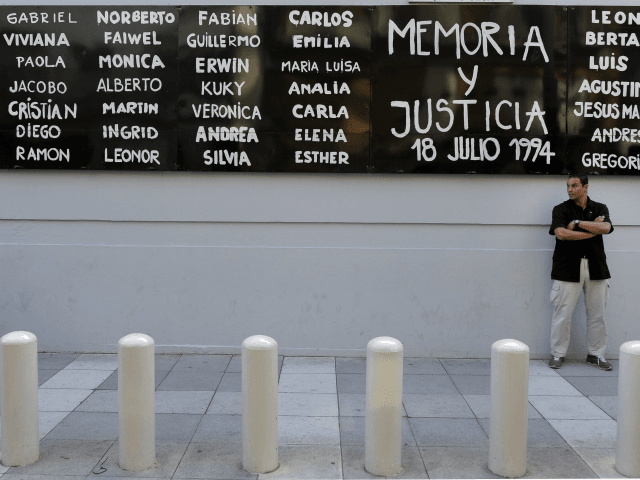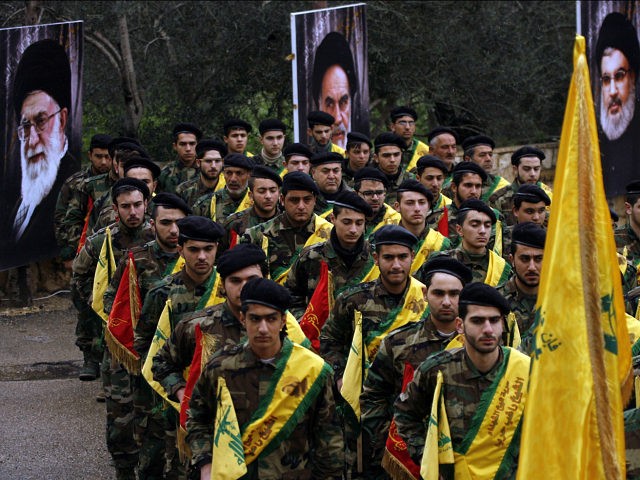Argentina designated the Iranian proxy organization Hezbollah an “Entity Tied to Acts of Terrorism” this week in anticipation of the anniversary of the 1994 bombing of the Argentine-Israeli Mutual Association (AMIA) headquarters Thursday, at its time the deadliest terrorist attack in the modern history of the Western Hemisphere.
The 1994 AMIA bombing – the second against an Israeli target in Argentina in as many years, believed to have been orchestrated by the same actors tied to the Iranian regime – remains the second-deadliest attack in the hemisphere’s history after the al-Qaeda attacks on September 11, 2001, killing 85 people between five and 73 years old.
Argentina’s Financial Information Unit (UIF) added Hezbollah to its Public Registry of Persons and Entities Tied to Acts of Terrorism on Wednesday, which freezes the organization’s assets and any assets that Hezbollah’s leaders may have stashed in the country. UIF chief Mariano Federici called Hezbollah “a current and active threat” to the Argentine homeland.
Argentina’s Public Registry of Persons and Entities Tied to Acts of Terrorism was only one day old when the UIF added Hezbollah to it. Macri created it on Tuesday to help the Ministry of Justice more easily keep funds out of terrorists’ hands. Buenos Aires’ announcement of the new registry also stated it would “allow access to and exchanges over information on people and entities tied to acts of terrorism and/or their financing and facilitate domestic and international cooperation to prevent, combat, and eradicate terrorism and its financing.”
Macri led an observance ceremony on Thursday for the victims of the AMIA attack, calling for those responsible to “be judged on Argentine soil,” for Interpol not to withdraw its red alerts, and “for no other country to give them diplomatic immunity,” which some of the suspects have received from Iran. In reporting on the new Hezbollah terrorist designation, Iranian’s state-run PressTV once again refuted any involvement in the attack, calling Argentina’s evidence “trumped-up charges.”
“Argentina accuses the Lebanese movement of carrying out the bombing, an allegation that Hezbollah describes as ‘categorically false,'” PressTV noted. “However, Buenos Aires has so far failed to provide substantial evidence and prove that Hezbollah was behind the attack.”
Through the work of Argentine prosecutor Alberto Nisman, authorities in Buenos Aires identified multiple Hezbollah and Iranian government officials as the culprits of the attack, successfully securing six Interpol red notices in 2007, which advise governments to arrest the men if they enter their respective territories. Nisman was found dead with a gunshot wound in his head in January 2015, the night before he was scheduled to present to the Argentine Congress a 300-page report accusing then-President Cristina Fernández de Kirchner of protecting the AMIA culprits in exchange for favorable trade deals with Iran.

A man stands guard in front of the headquarters of AMIA (Argentine Israelite Mutual Association), in Buenos Aires to protest against the death of Argentine public prosecutor Alberto Nisman, who was found shot dead earlier, just days after accusing President Cristina Kirchner of obstructing a probe into a 1994 Jewish center bombing. (ALEJANDRO PAGNI/AFP/Getty Images)
Police have not arrested, or even identified, anyone tied to Nisman’s death. In the immediate aftermath of his shooting, Fernández’s top prosecutor ruled the death a “suicide,” triggering widespread national protests against the socialists in power.
This week, the Argentine newspaper Clarín revealed that, according to intelligence documents, many of the same Hezbollah members and Iranian agents tied to the 1992 bombing of the Israeli embassy in Argentina also participated in the AMIA bombing, taking advantage of lax border security measures in the South American country to smuggle explosives into the capital.
“All of the Hezbollah jihadist activists and logistics operatives left the country after that terrorist attack,” Clarín noted. “And they returned. The same ones. … the bombs were different but manufactured by the same person.”
The newspaper identifies Hezbollah bombmaker Malek Obeid as the “engineer” behind the attacks. According to Nisman’s investigations, Hezbollah targeted Argentina because Buenos Aires failed to deliver on an agreement to sell nuclear weapons materials to Tehran.
Current President Mauricio Macri, a conservative, won the 2015 election largely on his promise to bring both the AMIA terrorists and Nisman’s killers to justice. His first act as president was to cancel a “memorandum of understanding” with Iran that Fernández had signed limiting investigations on the AMIA bombing.
The administration of U.S. President Donald Trump has offered Macri its full backing in bringing Iran to justice. In a statement honoring the victims of the AMIA bombing, the U.S. Department of State categorically described the attack as being “perpetrated by Hizballah at the direction of the Iranian regime” and said it “targeted the Jewish community and affected all those who support democratic values.”
“We remind the world that, while Argentine authorities continue their work to bring the perpetrators of these attacks to justice, the Iranian regime has yet to cooperate fully with them,” State Department spokesperson Morgan Ortagus said in a statement, adding that Secretary of State Mike Pompeo would attend an anti-terror event in Buenos Aires this weekend.
In Congress, Senators Marco Rubio (R-FL) and Ben Cardin (D-MD) sent a letter Thursday to Attorney General William Barr urging the Department of Justice to do more to enforce the Interpol red alerts against the suspected AMIA jihadists.
“While the red notices remain valid, however, INTERPOL member states have not acted on them with sufficient urgency for the previous 12 years,” the senators wrote. “Despite international recognition that these Iranian officials were the masterminds of the AMIA bombing, they continue to hold positions of responsibility in the Iranian government, engaging in or supporting troubling malign activity worldwide.”
“We therefore urge the Department of Justice to support Argentina each time one of the implicated Iranian individuals in question travels outside of Iran. This is an important action that the U.S. can take to ensure Iran is not able to engage in terrorism with impunity, even 25 years after an attack,” the senators wrote.

COMMENTS
Please let us know if you're having issues with commenting.